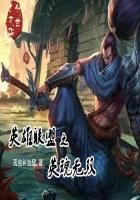The father, standing in the doorway, swayed his feeble body, leaning his hands against the door posts, and, with his head bent on one side and eyes half shut, stared at his son in silence. The son stood about three steps away from him; his head already gray, was lifted high; he knitted his brow and gazed at his father with large dark eyes. His small, black, pointed beard and his small moustache quivered on his meagre face, with its gristly nose, like that of his father. And the hat, also, quivered in his hand.
From behind his shoulder Foma saw the pale, frightened and joyous face of Luba--she looked at her father with beseeching eyes and it seemed she was on the point of crying out. For a few moments all were silent and motionless, crushed as they were by the immensity of their emotions. The silence was broken by the low, but dull and quivering voice of Yakov Tarasovich:
"You have grown old, Taras."
The son laughed in his father's face silently, and, with a swift glance, surveyed him from head to foot.
The father tearing his hands from the door posts, made a step toward his son and suddenly stopped short with a frown. Then Taras Mayakin, with one huge step, came up to his father and gave him his hand.
"Well, let us kiss each other," suggested the father, softly.
The two old men convulsively clasped each other in their arms, exchanged warm kisses and then stepped apart. The wrinkles of the older man quivered, the lean face of the younger was immobile, almost stern. The kisses had changed nothing in the external side of this scene, only Lubov burst into a sob of joy, and Foma awkwardly moved about in his seat, feeling as though his breath were failing him.
"Eh, children, you are wounds to the heart--you are not its joy,"complained Yakov Tarasovich in a ringing voice, and he evidently invested a great deal in these words, for immediately after he had pronounced them he became radiant, more courageous, and he said briskly, addressing himself to his daughter:
"Well, have you melted with joy? You had better go and prepare something for us--tea and so forth. We'll entertain the prodigal son. You must have forgotten, my little old man, what sort of a man your father is?"Taras Mayakin scrutinized his parent with a meditative look of his large eyes and he smiled, speechless, clad in black, wherefore the gray hair on his head and in his beard told more strikingly.
"Well, be seated. Tell me--how have you lived, what have you done? What are you looking at? Ah! That's my godson. Ignat Gordyeeff's son, Foma. Do you remember Ignat?""I remember everything," said Taras.
"Oh! That's good, if you are not bragging. Well, are you married?""I am a widower."
"Have you any children?"
"They died. I had two."
"That's a pity. I would have had grandchildren.""May I smoke?" asked Taras.
"Go ahead. Just look at him, you're smoking cigars.""Don't you like them?"
"I? Come on, it's all the same to me. I say that it looks rather aristocratic to smoke cigars.""And why should we consider ourselves lower than the aristocrats?" said Taras, laughing.
"Do, I consider ourselves lower?" exclaimed the old man. "Imerely said it because it looked ridiculous to me, such a sedate old fellow, with beard trimmed in foreign fashion, cigar in his mouth. Who is he? My son--he-he-he!" the old man tapped Taras on the shoulder and sprang away from him, as though frightened lest he were rejoicing too soon, lest that might not be the proper way to treat that half gray man. And he looked searchingly and suspiciously into his son's large eyes, which were surrounded by yellowish swellings.
Taras smiled in his father's face an affable and warm smile, and said to him thoughtfully:
"That's the way I remember you--cheerful and lively. It looks as though you had not changed a bit during all these years."The old man straightened himself proudly, and, striking his breast with his fist, said:
"I shall never change, because life has no power over him who knows his own value. Isn't that so?""Oh! How proud you are!"
"I must have taken after my son," said the old man with a cunning grimace. "Do you know, dear, my son was silent for seventeen years out of pride.""That's because his father would not listen to him," Taras reminded him.
"It's all right now. Never mind the past. Only God knows which of us is to blame. He, the upright one, He'll tell it to you--wait!
I shall keep silence. This is not the time for us to discuss that matter. You better tell me-- what have you been doing all these years? How did you come to that soda factory? How have you made your way?""That's a long story," said Taras with a sigh; and emitting from his mouth a great puff of smoke, he began slowly: "When Iacquired the possibility to live at liberty, I entered the office of the superintendent of the gold mines of the Remezovs.""I know; they're very rich. Three brothers. I know them all. One is a cripple, the other a fool, and the third a miser. Go on!""I served under him for two years. And then I married his daughter," narrated Mayakin in a hoarse voice.
"The superintendent's? That wasn't foolish at all." Taras became thoughtful and was silent awhile. The old man looked at his sad face and understood his son.
"And so you lived with your wife happily," he said. "Well, what can you do? To the dead belongs paradise, and the living must live on. You are not so very old as yet. Have you been a widower long?""This is the third year."
"So? And how did you chance upon the soda factory?""That belongs to my father-in-law."
"Aha! What is your salary?"
"About five thousand."
"Mm. That's not a stale crust. Yes, that's a galley slave for you!"Taras glanced at his father with a firm look and asked him drily:
"By the way, what makes you think that I was a convict?"The old man glanced at his son with astonishment, which was quickly changed into joy:














